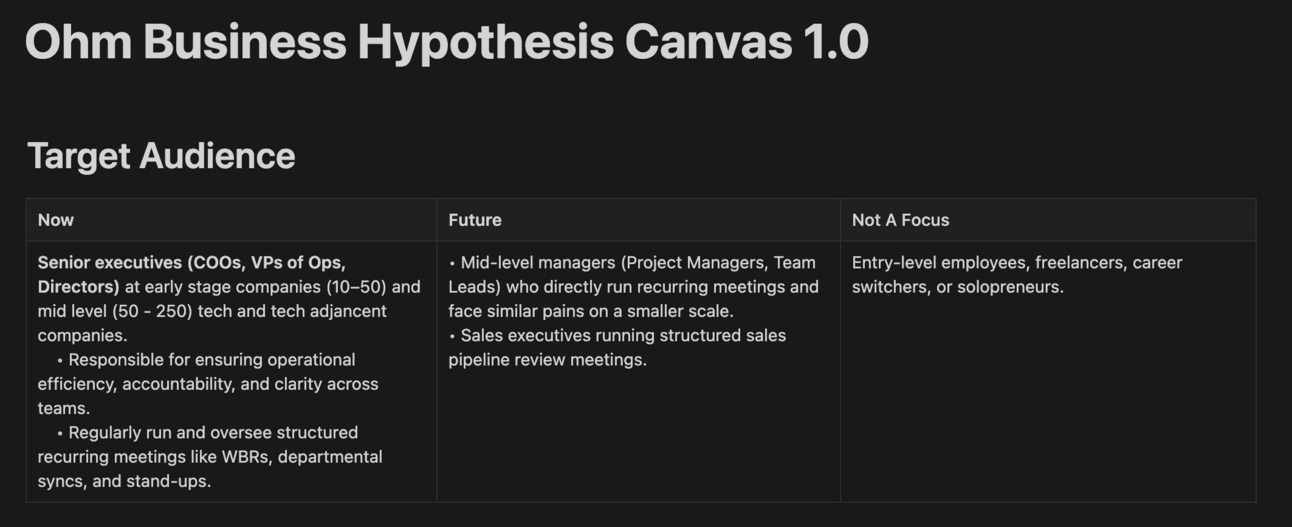Not subscribed? Sign up to get it in your inbox every week.

⚙ Hi {{first_name_tally|Operator}},
You opted in to follow our four-week sprint. But first, let me tell you about the week that changed everything before we even started.
We thought we had a solid plan. We even had an MVP to show people.
Reality had other plans.
The Hypothesis Canvas That Started It All
Before we started the sprint, I spent two days organizing our scattered ideas into a framework: Now, Future, Not A Focus.
The original hypothesis was simple: operators needed opinionated meeting assistants with structured "chapters" aligned to predefined agendas. Add instant AI documentation and automated follow-ups.
It made perfect sense on paper.
We even built an MVP to validate this. It felt ready to ship.
The Demo That Died in the Room
Week 0 started with confidence. We had 40 demo calls scheduled. The plan: show operators our MVP, get validation, start building.
The first call went... fine. Not great, but fine.
By the third call, I realized we had a problem. People were polite about the demo, but their energy shifted when we started talking about what would actually help them.
A startup COO sat through the whole thing, then said: "Look, I appreciate what you're building, but this feels like another tool I'd have to convince my team to use. We already tried Notion. And Airtable. And Linear. They all had great features. None of them stuck."
That comment hit differently than the others. Three tools, all with "great features," all failed adoption. I spent the next hour staring at our MVP demo, asking myself: are we building another product that nobody will use?
I decided to stop demoing entirely.
What These Calls Actually Taught Us
The remaining calls became pure discovery. No demo, just questions. The patterns that emerged rewrote everything:
What we got right:
The pain is universal. Every single person we talked to has meeting fatigue.
Context switching is the real killer, not just meeting length.
People are indeed improvising with inadequate tools.
What we got completely wrong:
Agenda adherence isn't the top concern. Most operators said "I don't care if we go off agenda if we're solving the right problems."
AI documentation isn't trusted yet. Most operators told us they'd rather have a human take notes than trust AI to capture nuances.
The real bottleneck isn't only during meetings—it's before and after. People know what happened; they struggle with "what happens next." Or they struggled to prep for the meeting they were about to lead
But then I heard something . One operator said: "I spend my days translating context between teams. I'm like a human API, but for decisions."
This reframed everything. we weren't solving a meeting problem. We were looking at a fundamental breakdown in how information moves through organizations.
Why hasn't this been solved? Because every "solution" treats the symptom, not the disease. We build better meeting tools when the real problem is that information dies the moment a meeting ends.
Every organization we spoke with struggled with the same three issues:
Information Capture vs Participation - You can't effectively participate while documenting. Focus on one, miss the other.
Knowledge Accessibility - "What did we decide about X last week?" It's buried somewhere. Easier to schedule another meeting.
Context Translation - Information breaks down when moving between meetings, people, tools. Every handoff becomes telephone.
The cycle is predictable: poor capture leads to difficult access, which causes context failures, resulting in more meetings.
This is a $2.1 million problem for a 100-person startup. Here's the math: Average salary ($120K) × time spent in bad meetings (50%) × team size (50) = $2.1M in opportunity cost .
The Design Partner Pivot
Instead of trying to validate a predetermined solution, we decided to build something completely different with operators.
The last 10 calls became recruitment pitches. Here's the ask I made:
"We're scrapping our original MVP. We want to work with 5 operators to build something that actually solves your problems. You in?"
5 people said yes immediately. No negotiation. No "let me think about it."
The type of operators we're working with usually deals with:
Celebrity founders who forget what they decided between media appearances
Client workshops where missing one nuance kills a $50K project
40+ calls per week across time zones, can't remember which client said what
Synthesizing context across multiple portfolio companies while teams work in completely different industries
a regulated industry where an AI transcription bot doesnt understand the context of the acronyms used
These aren't edge cases. They're the norm. Most operators juggle completely different contexts every day.
What's Next
Our design partners already have access to our Slack community, and we've learned enough to know what we're NOT building.
No agenda trackers. No passive transcription bots. No shared docs where people fight over who edited what.
We're building something that repairs these broken information flows—a tool that solves the participation vs. documentation tension, lowers the knowledge accessibility threshold, and enables seamless context translation between meetings, people, and tools.
Here's my bet: Fix how information moves between people, and half your recurring meetings become unnecessary.
Our design partners told us they'd pay $50/month to reduce time spent in a certain type of meeting. Vote below for a chance at a prize.
Which meetings do you think they mentioned?
Wednesday's update will show you what we build in Week 1, how our design partners react, and which of our remaining assumptions survive their first contact with real users.
We haven't even started the sprint yet and we've already killed our first product. That's either good product discipline or a sign we have no idea what we're doing.
Probably both.
See you Wednesday,
Rameel


